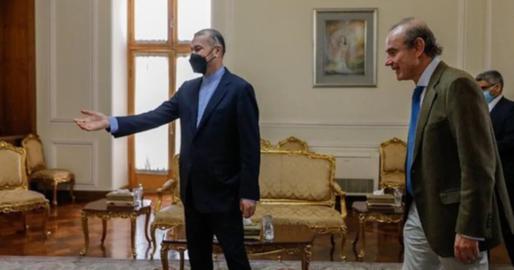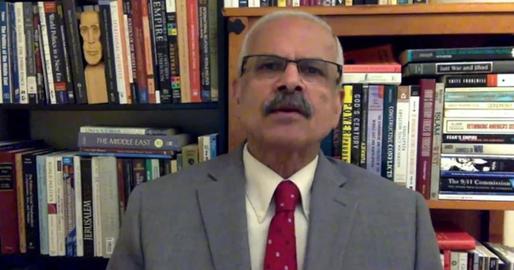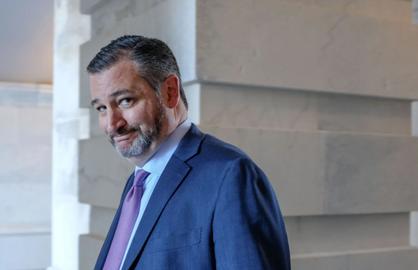The government of the Islamic Republic continues to court ridicule by sanctioning American officials in a time when Tehran’s economic clout has never been weaker. The latest “targets” were some 24 US officials, bringing the total close to 100.
New additions to the list include an ex-commander of US Central Command, General Joseph Votel, and Rudi Giuliani, Donald Trump’s personal lawyer and a former mayor of New York. The list also includes 15 Americans sanctioned for alleged human rights violations, among them US Treasury and Commerce department officials under Donald Trump and Barak Obama.
No Prospect of Success
Jalil Roshandel, an associate professor of political science at East Carolina University, told IranWire the sanctions were symbolic and “100 percent” intended to bolster the image of the Islamic Republic internally.
Iran, he points out, can impose its own sanctions, but has no means of enforcing them in practice because the sanctioned officials have no dealings with Iran, nor any reason to care about being sanctioned by Iran. What’s more, the Islamic Republic has no allies in the region to follow suit.
In an article on January 20, the Young Journalists Club – an affiliate of Islamic Republic of Iran Broadcasting (IRIB) – conceded these sanctions would do nothing, except perhaps influence the behavior of Iran-linked proxy groups in the region. “American officials are increasingly worried their forces will be hit with attacks by resistance groups,” the article claimed.
In January 2022, after 52 American officials were sanctioned by the Islamic Republic, Jake Sullivan, national security advisor to President Biden, had warned that any attack on American citizens by the Islamic Republic would have “serious consequences”.
A Gesture
The Islamic Republic imposed the latest sanctions while the Vienna talks are again at a standstill, this time due to Tehran having insisted the IRGC be de-designated as a terror entity. It also emerged last week that the US has failed to respond to the Islamic Republic’s latest message, conveyed to US representatives via the EU’s Enrique Mora.
Even inside Iran, though, the sanctions have barely made the news. Even principalist media outlets only reported the base story and nothing more. It may be that the Foreign Ministry is only “working to rule” so as to meet its obligations under a 2017 act of parliament entitled “Confronting American Violations of Human Rights and Terrorist Acts in the Region”. The law required the Ministry to identify individuals it could apply to and publish them in a sanctions list, to be updated every six months.
Last year on October 24, Iran sanctioned the American ambassador to Iraq and other officials for involvement in Soleimani’s assassination. A month later, Kazem Gharibabadi, secretary of the Iranian judiciary’s High Council for Human Rights, said “more than 20 American real and legal individuals” had been sanctioned over their human rights record. The 52, including Donald Trump, were sanctioned on the two-year anniversary of Soleimani’s death.
Quite a few Americans have ridiculed the sanctions against them over the years. In 2000 Iran’s Foreign Ministry added the name of Richard Goldberg, a member of the Foundation for Defense of Democracies and a former expert with the White House National Security Council, to its sanctions list: In response, he tweeted: “Today I gain a new badge of honor: ‘sanctioned’ by Iran for coordinating... the maximum pressure campaign.”
Republican Senator Ted Cruz had a different take. “Dammit. Now Heidi [his wife] and I are going to have to change our Christmas plans.”
“Haven’t seen Iran on any of the world’s best places to travel lists,” tweeted John Bolton, Trump’s former National Security Advisor. “Maybe people would actually want to visit if it stopped funding terrorism and started behaving like a normal country.”
Of course, there have been serious responses as well. On January 9, the White House announced that Iran will face serious repercussions if it attacks Americans, including any of those anctioned by Tehran for the 2020 killing of Soleimani. “We will work with our allies and partners to deter and respond to any attacks carried out by Iran,” said White House national security adviser Jake Sullivan in a statement. “Should Iran attack any of our nationals, including any of the 52 people named yesterday, it will face severe consequences.”
visit the accountability section
In this section of Iran Wire, you can contact the officials and launch your campaign for various problems




























comments